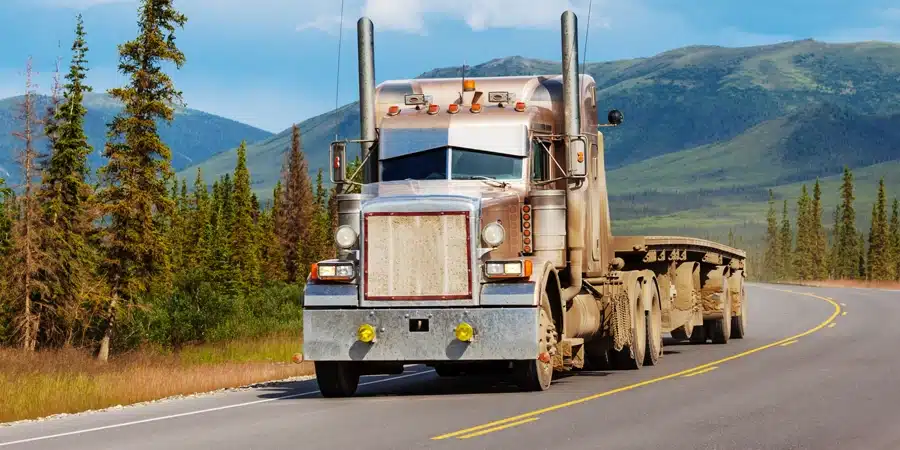Trucking Motor Carrier Insurance Requirements
Experienced truck accident attorneys have a thorough knowledge and understanding of motor carrier insurance regulations and their relevance to personal-injury actions seeking damages for injuries and deaths caused by carrier or driver negligence. Motor carriers are required by federal regulations to carry minimum amounts of public-liability insurance coverage for bodily injuries, property damage, or environmental restoration caused by carrier negligence and are prohibited from operating commercial motor vehicles (CMV) until they have obtained and have in effect the minimum levels of coverage specified in the Federal Motor Carrier Safety Regulations (FMCSR). 49 CFR § 387.7. Any person who knowingly violates the rules regarding motor-carrier financial responsibility may be fined up to $11,000 for each violation. If a violation is a continuing one, the person may be fined up to $11,000 for each day during which the violation occurs. 49 CFR §387.17.

Motor carriers of non-hazardous property, for example, must carry at least $750,000 of coverage for injuries caused to members of the public in accidents with for-hire commercial motor vehicles (CMV) in interstate or foreign commerce with a gross vehicle weight rating (GVWR) of 10,000 or more pounds. 49 CFR § 387.9. Carriers of hazardous substances, as defined in 49 CFR § 171.8 or 173.403, in foreign, intra- or interstate commerce by for-hire or private CMV with a GVWR of 10,000 or more pounds must carry at least $5 million in coverage. 49 CFR § 387.9. Certain carriers of oil listed in 49 CFR § 172.101, and of certain hazardous waste, materials, or substances defined in 49 CFR § 171.8, must carry a minimum of $1 million in coverage. 49 CFR § 387.9.
MCS-90 Endorsements
Motor carriers must prove they have obtained the minimum levels of insurance required by law. Under Sections 29 and 30 of the Motor Carrier Act of 1980 (MCA), such proof may be provided by an MCS-90 endorsement or a Motor Carrier Surety Bond for Public Liability. 49 CFR §§ 387.7 (d) (2), 387.15.
MCS-90 endorsements, which can be attached to any policies for primary or excess insurance, are intended to allow recovery of judgments for injuries or deaths sustained by members of the public as a result of carrier negligence even when carriers are bankrupt or insolvent. Policies with MCS-90 endorsements cannot be cancelled by insurance companies without notice specified in the endorsement, 49 CFR § 387.15. (See also 49 CFR § 387.7.)
An MCS-90 endorsement provides that the insurer agrees to pay, within the liability limits described in the endorsement, any final judgment recovered against the insured motor carrier for injury or death to members of the public resulting from the negligent operation, maintenance, or use of certain motor vehicles (including trucks and other CMV, even if the specific vehicle involved in an accident leading to judgment against the carrier is not specifically described in the policy to which the endorsement is attached. 49 CFR § 387.15. The insurer also agrees, under an MCS-90 endorsement, to pay such judgments even when the negligence leading to injury and judgment did not occur on a route or territory authorized to be served by the insured carrier. 49 CFR § 387.15.
The limits of coverage specified in MCS-90 endorsements apply separately to each accident of an insured, so that any payment made in relation to one accident will not reduce the insurer’s liability for payment of final judgments resulting from other accidents. 49 CFR § 387.15. Though the MCS-90 endorsement applies only to accidents that occur while a carrier is operating in interstate commerce, states may enact their own regulations requiring similar endorsements on policies issued to carriers operating in intrastate commerce.

Applicability to Owner-operators of CMV
Owner-operators of CMV may operate as independent motor carriers (private carriers) or may be leased to other motor carriers, as long as they comply with certain requirements, including proof of the minimum insurance specified in 49 CFR § 387.9. When a lease agreement is executed between an owner-operator and a motor carrier regarding the carrier’s use of the owner-driver in its trucking business, the owner-operator operates under the motor carrier’s authority. 49 CFR Part 376. In these circumstances, the owner-operator will be covered by the carrier’s insurance. This is so even when the owner-operator is an independent contractor rather than an employee of the carrier. See 49 CFR § 376.12 (4).
Lessors of CMV
The owner of a CMV may also lease a CMV to a carrier without simultaneously leasing the CMV owner or someone else as a driver. 49 CFR § 376.2. Such a lease will generally provide that the carrier has exclusive possession, control, and use of the CMV during the duration of the lease and that the carrier assumes complete responsibility for the CMV’s operation during the lease. 49 CFR § 376.12.
Insurance coverage may be obtained by such an owner to cover non-owner drivers even when the owner takes no part in the commercial trucking business in which the leasing company or driver is engaged and when the driver is not employed by the CMV owner. CMV owners may also purchase additional coverage, through non-trucking or bobtail policies, for accidents or damage that occurs when a truck is being used for something other than trucking business or is not being operated at the direction of a trucking company.
Self-insurance
The FMCSA may approve a motor carrier’s self-insurance, under certain conditions. 49 CFR § 387.309. A carrier’s self-insurance may be approved by the FMCSA only if, among other things, the carrier provides a true and accurate statement of its financial condition and furnishes additional evidence that it is able to satisfy its obligation for bodily injury, property damage, or cargo liability. 49 CFR § 387.309.
The insurance aspect of trucking-injury cases can be extremely complex and requires the skill and knowledge of truck-accident lawyers experienced in this particular area of insurance regulation and law. The esteemed truck-injury lawyers at The Truck Injury Firm have a thorough knowledge and understanding of these laws and can help you understand the impact they may have upon damages recoveries against negligent trucking companies and drivers. Contact our nationally respected team of truck accident lawyers for aggressive and expert assistance with your case.







